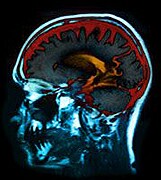
FRIDAY, Aug. 19 (HealthDay News) — Children of mothers with depression have an enlarged amygdala, the part of the brain associated with emotional responses, Canadian researchers have found.
The team used MRI scans to examine the brains of 10-year-old children of mothers who’ve had symptoms of depression throughout their lives.
The results suggest that children’s brains are sensitive to the quality of care they receive, the University of Montreal researchers said.
The study authors noted that previous studies found similar changes in the brains of children who were adopted by families after being initially raised in orphanages.
The amygdala assigns emotional significance to information and events and plays a role in how we respond to potential risks, according to background information provided in a university news release.
“We do not know if the enlargement that we have observed is the result of long-term exposure to lower quality care. But we show that growing up with a depressed mother is associated with enlarged amygdala,” Dr. Sonia Lupien and colleagues said in the news release.
The findings, published online Aug. 15 in the journal Proceedings of the National Academy of Sciences, strongly suggest “that the brain may be highly responsive to the environment during early development and confirms the importance of early intervention to help children facing adversity,” Lupien said.
“Initiatives such as prenatal and infancy nurse home visits and enriched day care environments could mitigate the effects of parental care on the developing brain,” she added.
More information
The American Academy of Pediatrics has more about motherhood and mood.

